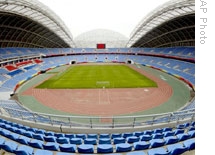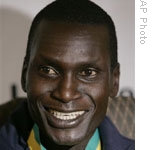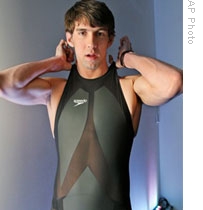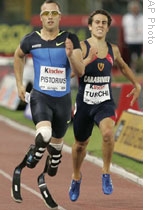VOA慢速英语-EXPLORATIONS - Going for the Gold at the Olympics in
搜索关注在线英语听力室公众号:tingroom,领取免费英语资料大礼包。
(单词翻译)
The Olympics are about sports, fair play and national pride.
22 July 2008
VOICE ONE:
I'm Steve Ember.
VOICE TWO:
And I'm Barbara Klein with EXPLORATIONS in VOA Special English. Today we tell about the two thousand eight summer Olympic games. They open August eighth in China's capital, Beijing.
(MUSIC)
VOICE ONE:
 |
| Newly prepared Wulihe Stadium in Shenyang. Twelve Olympic soccer games will be held here. |
More than ten thousand men and women will compete for twenty-one days at the Beijing Olympics. They are representing more than two hundred nations. National pride is an important part of the Olympic games. For example, Aminata Diouf will leave her beauty care business in Senegal to represent her country in track and field. This will be her third trip to the Olympics. She says the experience is always emotional.
AMINATA DIOUF: "I feel like an ambassador1, who is very proud. It is this motivation that makes you want to train at two hundred percent of your abilities. The goal is to satisfy an entire nation."
VOICE TWO:
All of the competitors have the same dream -- to win a gold medal. But not all dreams are equal. Athletic2 training costs a lot of money. So athletes from industrial countries usually win more medals than those from developing countries. How a country pays for its Olympic program shows that nation's social and political values.
VOICE ONE:
In Kenya, for example, the government pays all the costs for the country's Olympic program. The Kenyan Athletic Association says its budget is about one million, five hundred thousand dollars. It plans to send eighty athletes to the Beijing Olympics.
 |
| Robert Cheruiyot |
One of Kenya's best hopes for an Olympic medal is Robert Cheruiyot. He is known in the United States for running in the Boston Marathon. He has won the race four times. He says: "When I am running I can hear the national song of Kenya. When I train I can hear Kenya's national song." But the runner has not received any money from the Kenyan government to prepare for the Olympics in Beijing.
VOICE TWO:
David Wallechinsky has written several books about the Olympics. He says some government-supported Olympic programs are poorly operated.
DAVID WALLECHINSKY: "The problem is, like anything else you put the government in charge of, there is a certain amount of corruption3 in most of these countries. A lot of the officials take most of the money, and it doesn't really get to the athletes. Not all countries are like that, but it is quite common."
VOICE ONE:
In Russia, public money and donations from private businesses support Olympic athletes. But Russian Olympic cyclist Sergei Ruban says some donors4 are only interested in sports that are popular on television. He says companies want the attention that comes from being linked to popular athletes.
The United States is one of only three countries where Olympic athletes receive no government money. Instead, the United States Olympic Committee receives money from the sale of television broadcast rights and donations from businesses.
VOICE TWO:
Steve Roush is chief of sports performance with the United States Olympic Committee. He says America's Olympic program must compete for financial support with professional sports teams.
Mister Roush says that, like in Russia, businesses in the United States like popular sports more than others. Many Olympic gold medal winners from the United States later make millions of dollars by advertising5 products. These include the top swimmers and gymnasts.
However, some private projects support athletes in less popular sports like distance running. For example, Keith Hanson and his brother own shoe stores in Detroit, Michigan. They provide distance runners with free housing, health care, training, free running shoes and part-time jobs in their stores.
(MUSIC)
VOICE ONE:
The Olympic games include more than three hundred sporting events. Professional athletes will compete in many events, like swimming and basketball. But many athletes who have never earned money from sports will compete in other events. These amateur6 athletes will probably never become rich or famous. They must balance work at their jobs with training. They also struggle to pay for their own travel and other costs. Still they do it all for the chance to seek the Olympic dream.
For example, Cambodian runner Hem7 Bun Ping receives some government support, about thirty dollars a month. But he says he cannot pay for the diet he needs to compete against professional athletes. Still, he says, he will do his best.
VOICE TWO:
Steve Roush of the United States Olympic Committee notes that common people all around the world work very hard to win a place on an Olympic team.
STEVE ROUSH: "I think it's the purity8 of the Olympics that changes people's mindset. I also think there is a thing that I refer to as Olympic fever. Sometimes when you catch that, it's very hard to do anything but pursue it."
Mister Roush says the general public still likes amateur athletes better than professionals because they are sacrificing so much. He says the amateur athletes who compete in Beijing will influence Olympic hopefuls around the world.
(MUSIC)
VOICE ONE:
The International Olympic Committee bans the use of drugs that improve performance. The World Anti-Doping Agency says the drugs threaten the quality of the competition and also may cause health risks. Yet some athletes have reportedly been using banned substances like steroids to improve their performance for years.
Last year, American runner Marion Jones admitted that she lied to investigators9 about using performance-enhancing drugs. The five medals she won at the two thousand Olympics were taken away from her. And she was sentenced to six months in prison. Experts say this sends a message that performance-enhancing drugs are not accepted.
VOICE TWO:
The United States Anti-Doping Agency is supposed to guarantee that no athletes use such drugs. It performs eight thousand tests a year on American Olympians to find evidence of banned drugs like steroids. These drugs can build muscle but also may lead to kidney10 disease and cancer. The agency provides guidance about which drugs are banned. And it punishes athletes who violate11 the rules.
VOICE ONE:
Most countries now have programs to test and help Olympic athletes. For example, South Korea's Olympic program urges athletes to talk to medical experts before taking any medicines. Jang Sung-ho is a former Olympic medal winner. He said Olympic athletes today are careful because past athletes lost medals for unknowingly using banned substances.
For example, he said a runner once broke the rules by taking cold medicine that he bought in a drug store. Now all South Korean athletes get such medicines from their training center.
VOICE TWO:
Increased education and enforcement have made cheating with drugs more difficult. But experts say it is still possible. Peter Sonksen is a professor at Saint12 Thomas Hospital in London. He has advised the International Olympic Committee on doping. Doctor Sonksen says new drugs like human growth hormone13 are hard to discover in drug tests. He says new tests should be developed to keep sports free of drugs. Anti-doping officials say most athletes welcome increased testing as a way to guarantee the honesty of the Olympic games.
(MUSIC)
VOICE ONE:
 |
| American gold medalist and world record holder14 Michael Phelps wearing an LZR swimsuit |
Technology has long been used in sports to improve athletic performance. But this helps athletes in countries that have more technology.
For example, the International Sports Federation15 approved the use of a high-tech16 swimsuit called the LZR Racer. It reduces form drag while the athlete is swimming quickly through the water. It also helps keep the athlete's body position in the water. Athletes wearing the LZR Racer have broken more than forty world swimming records since February. The swimsuit costs more than five hundred dollars. Critics have compared it to taking performance-enhancing drugs.
VOICE TWO:
 |
| Oscar Pistorius |
Technology also has helped South African runner Oscar Pistorius, who lost both his legs. He uses two specially17 made legs that have racing18 blades as feet. At first, the International Association of Athletics19 Federations20 barred him from competing. It said his man-made legs would permit him to run faster without working as hard as he would on two real legs.
Later, Pistorius won a decision permitting him to compete. But he failed to run fast enough during time trials last week. So he was not chosen for South Africa's Olympic team.
Some Olympic officials say technology may not be so important after all. They say the competitions will be decided21 by the ability and hard work of the athletes.
(MUSIC)
VOICE ONE:
This program was written by Brian Padden and adapted by Shelley Gollust. Our producer was Lawan Davis. I'm Steve Ember.
VOICE TWO:
And I'm Barbara Klein. You can download audio and read scripts on our Web site, voaspecialenglish.com. Join us again next week for Explorations in VOA Special English.
 收听单词发音
收听单词发音 




